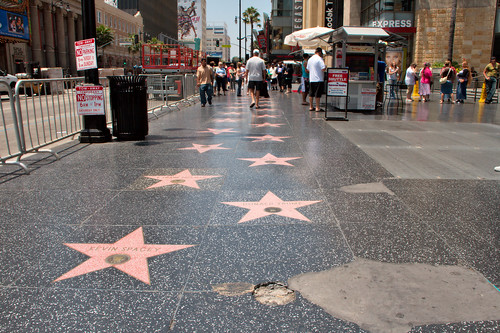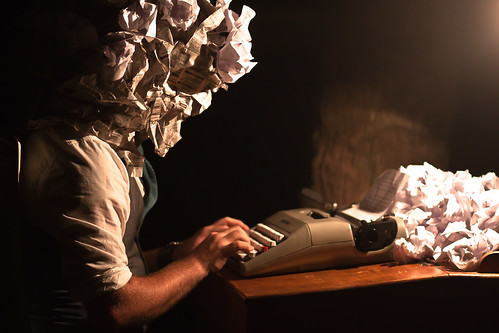Every writer strives for authenticity, even in fantasy writing. It's important to create real, relatable characters that readers can connect with as they move through the story. And what's more relatable than the famous celebrities who populate the real world? There are some names that everyone's heard of, and in creating a believable character you might want to throw some of these celebs into your story. Whether it's a casual mention or something more, there's some important stuff you need to know before you use a celebrity name...like the fact that you might get sued for doing it. Using celebrity names is tricky, so you might want to think twice before you put them in your self-published book.
The Line Between Fiction and Reality
In creating a character that feels real, many writers use real settings for their stories. You might move your characters around on a university campus that genuinely exists, take them to a park you yourself have visited, have them eating foods that you've enjoyed in the past. Little details like this make characters jump off the page and become more like real people.
And sometimes, you might have occasion to insert real people into your fiction. Suppose your character is into politics, a big-time sports fan, or loves a certain television show. Maybe they go on a date to a popular movie, or have a crush on a well-known movie star or musician. These details do great things for a book's authenticity, but they can do bad things to you as a writer.
Celebrities in Fiction
Celebrities appear in causal real-world conversations all the time, but when you put those names in print everything changes. Newspapers, television shows and people who publicly mention celebrity names do so with caution, and as a fiction writer you should, too.
But it's fiction! Isn't it okay to use the names of public figures in fiction, since you're only trying to tell a story? No, sometimes it's not.
More and more courts are recognizing that celebrities are also self-made brands, and in some legal cases the court has sided with the celebrity. In other words, if the celebrity doesn't like the way they're being portrayed even in a fiction work, they may sue and the court may side with them. Celebrities and public figures may sue if their name is used; they may sue even if their name is not used but the character in question very strongly reflects the actual celebrity. One celebrity who was accused of theft, and won't be named here, sued a highly popular TV show because her name was casually mentioned between the characters on the show. There are countless examples of fiction works and projects that had to be changed because of lawsuits. So you have to be very careful when you start dropping celebrity names even in a work of fiction.
Even when the work is complimentary, celebrities have the power to file a lawsuit because they did not give their permission for their name and likeness to be used. You may think you're safe because you have only kind things to say about the celeb in question, but you never know how that person might react. A casual reference is probably pretty safe in most circumstances, but the door to lawsuits can be opened with even the smallest mention of a real person.
Can you use celebrity names in fiction? It's your book, and no one's going to stop you -- but no one's going to help you, either, if it all goes south. If you have questions about using a celebrity name or any other brand name, you should absolutely seek legal counsel. Full disclosure: I am not a lawyer, and I have no training in the law. So don't take my word for it -- talk to your own lawyer and check it out yourself before you put yourself in any legal danger.
The Line Between Fiction and Reality
In creating a character that feels real, many writers use real settings for their stories. You might move your characters around on a university campus that genuinely exists, take them to a park you yourself have visited, have them eating foods that you've enjoyed in the past. Little details like this make characters jump off the page and become more like real people.
And sometimes, you might have occasion to insert real people into your fiction. Suppose your character is into politics, a big-time sports fan, or loves a certain television show. Maybe they go on a date to a popular movie, or have a crush on a well-known movie star or musician. These details do great things for a book's authenticity, but they can do bad things to you as a writer.
Celebrities in Fiction
Celebrities appear in causal real-world conversations all the time, but when you put those names in print everything changes. Newspapers, television shows and people who publicly mention celebrity names do so with caution, and as a fiction writer you should, too.
But it's fiction! Isn't it okay to use the names of public figures in fiction, since you're only trying to tell a story? No, sometimes it's not.
More and more courts are recognizing that celebrities are also self-made brands, and in some legal cases the court has sided with the celebrity. In other words, if the celebrity doesn't like the way they're being portrayed even in a fiction work, they may sue and the court may side with them. Celebrities and public figures may sue if their name is used; they may sue even if their name is not used but the character in question very strongly reflects the actual celebrity. One celebrity who was accused of theft, and won't be named here, sued a highly popular TV show because her name was casually mentioned between the characters on the show. There are countless examples of fiction works and projects that had to be changed because of lawsuits. So you have to be very careful when you start dropping celebrity names even in a work of fiction.
Even when the work is complimentary, celebrities have the power to file a lawsuit because they did not give their permission for their name and likeness to be used. You may think you're safe because you have only kind things to say about the celeb in question, but you never know how that person might react. A casual reference is probably pretty safe in most circumstances, but the door to lawsuits can be opened with even the smallest mention of a real person.
Can you use celebrity names in fiction? It's your book, and no one's going to stop you -- but no one's going to help you, either, if it all goes south. If you have questions about using a celebrity name or any other brand name, you should absolutely seek legal counsel. Full disclosure: I am not a lawyer, and I have no training in the law. So don't take my word for it -- talk to your own lawyer and check it out yourself before you put yourself in any legal danger.




















